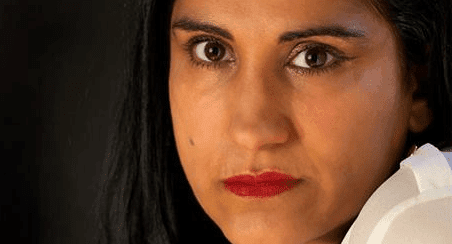
When she was eight she was promised to a man as his future bride.
At age 14 she saw his picture for the first time. He was shorter and much older than her.
And by the time she was 15, Jasvinder Sanghera's parents padlocked her in her room - a prisoner in her own home - because she said no to her forced marriage.
As the second youngest of seven sisters, Jasvinder witnessed first hand the process of forced marriages in her family. Her older sisters were married off as young as 15.
Her sisters all followed the same pattern: pulled out of school, sent to India, returned home to northern England with a husband (without going back to school), and dutifully stayed in a mentally and physically abusive marriage.
So when it was Jasvinder's turn, something within her rebelled. Her parents didn't take it well.
She was pulled out of school and locked in her bedroom. They brought her meals to her door. She had to get permission to go to the bathroom. And it was in this room that she hatched a plan.
She agreed to the marriage so she could plan her escape
Jasvinder's parents had closely controlled her for her whole life. She could only be friends with Indians. Luckily, she had the friend she needed. Her best friend's brother became key to her escape - and her secret boyfriend.
This boy told Jasvinder he wanted to be with her and would help her escape. To communicate, he would stand outside her house at night and lip read through the window. He even started saving money so he could help her.
"One day he dressed up as a woman and went into a shoe shop and pretended he was shopping," Jasvinder wrote for BBC. "He handed me a note which said, 'I'll be at the back of the house at this time - look out of the window.' So I did, and he mouthed for me to pack my wardrobe and I lowered two cases down using sheets tied together, and flushed the toilets so my mother wouldn't hear."
Now, Jasvinder herself just needed to wait for her moment of escape to come.
One day her front door was sitting open, so she ran outside and just kept running and running.
With the help of her boyfriend, Jasvinder escaped. He drove her to a new town.
But despite the abuse, Jasvinder missed her family. She called her mom to tell her she was safe, and she wanted to come home, but didn't want her forced marriage.
"Her response has stayed with me for the rest of my life," Jasvinder wrote. "She said: 'You either come back and marry who we say, or from this day forward you are now dead in our eyes.'"
For 35 years, Jasvinda, who now has three children of her own, has never received so much as a birthday card from her family. Her children have no connection with her family.
When her 25-year-old sister, Robina, committed suicide rather than stay in an abusive marriage, Jasvinder decided she must make something good come out of all this tragedy.
Robina had been in two abusive marriages. Despite the abuse, her parents told her she had a duty to remain in both marriages, and a community leader told her it was her responsibility to calm her husband's temper. Eventually, Robina set herself on fire and died.
Inspired by the tragedy, Jasvinder started Karma Nirvana, a charity that fights against forced marriages. Jasvinder helped make forced marriage illegal in the UK. Her charity has a helpline for victims, and helps create escape options and refuge.
It's evident her sister Robina is still one of the reasons she does this work. In a recent post on the Karma Nirvana website, Jasvinder's children wrote a letter to their deceased aunt. It reads:
I wish I had the chance to meet you, I know mum misses you everyday. Every Robin we see reminds us of you. My #BirthdayWishes to you is that you did not die in vein (sic), in your death thousands have been given a chance to access support and break the closed doors of honour. You will always be remembered.
According to the BBC, Karma Nirvana has helped over 50,000 victims - and they are still working to help even more.
Jasvinder is now a grandma, and one of her biggest accomplishments of all is knowing she broke the chain of abuse for her children, grandchildren and many future generations.
She wrote on Facebook, "I absolutely stand by my decision knowing that my children will never inherit legacies of abuse because of that decision aged 16."

